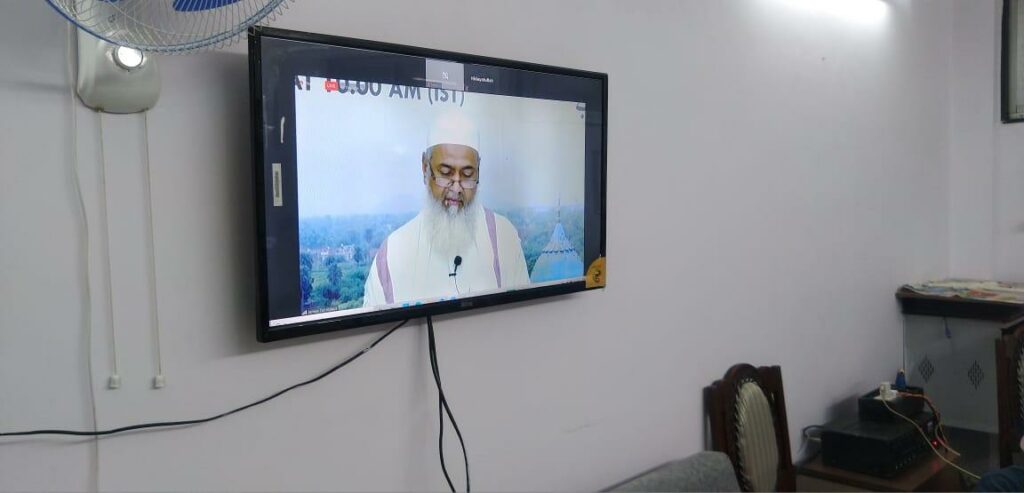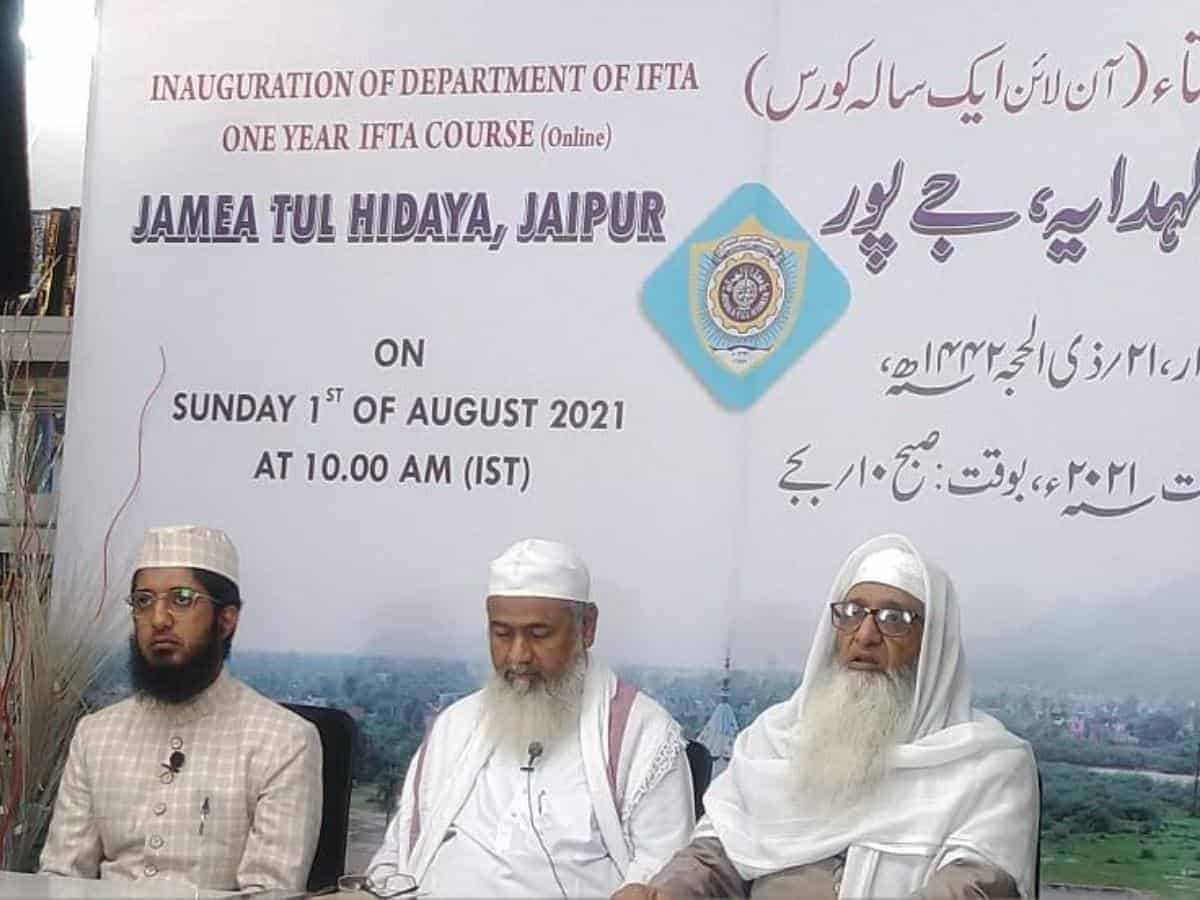By Pervez Bari
Jaipur: The Department of Ifta in the Jamea Tul Hidaya (University of Hidaya), Jaipur has been inaugurated with the commencement of one year Online Ifta Course from Sunday.
In the Online inauguration ceremony Maulana Rabey Hussaini, president of All India Muslim Personal Law Board (AIMPLB), presided while Maulana Khalid Saifullah Rahmani, acting General Secretary of the AIMPLB, was the chief guest of the programme. Maulana Mufti Atiq Ahmad Bastavi, Professor of Hadith and Jurisprudence, Nadwat Ulema, Lucknow, was Guest of Honour on the function.
Maulana Fazlur Rahim Mujaddidi, Rector of Jamea Tul Hidaya, Jaipur, delivered the welcome address on the occasion.
Maulana Mufti Mohammad Zakir Nomani Kashifi, Mufti-e-Shahar Jaipur and a teaching faculty of Hidaya University, inaugurated the online Ifta course by delivering a lecture to the students of Ifta. While at the outset Maulana Habibur Rahim recited verses from the Holy Qur’an to mark the event.
The Online programme was attended by Muslim clerics and others from Saudi Arabia, United Arab Emirates, Bahrain, Qatar and Oman in the Gulf countries and the United States, the United Kingdom, Portugal, Canada and others in the West, as well as from various parts of India.
Spirit of Islam religion
Maulana Rabey Nadvi in his presidential speech said that we are in dire need of scholars who not only understand the spirit of Islam religion but can also interpret Islam correctly. While appreciating the education system of Hidaya University which includes technical education also said that from the very beginning the university has stepped up with a curriculum compatible with modern and religious education. He said that Maulana Abdul Rahim Mujaddidi, the founder of the university, was one of the personalities who took a step in this direction realizing the dangers.
He said that Ifta is the interpreter of the Muslim world and the Muftis should be prepared from the Ifta Department who not only understand the religious consciousness and the spirit of the Islam but also can unite the Ummah cut off from the religion and guide it properly.
Maulana Khalid Saifullah Rahmani speaking as the chief guest on the occasion said that there are three main areas of Ifta, Qaza and Accountability which are important. He said that this Department of Ifta is very important because it provides guidance to the religion and the world. Due to this training was required for Ifta and Fatwa departments.
While Maulana Atiq Ahmad Bastavi, addressing said that it was important for the students of Ifta Department not only to join the Ifta course for the title of Mufti but also to take up the course with sincerity and religious guidance.

Difference between ‘Fatwa’ & ‘Qaza’
While acting as a host on this occasion, Maulana Fazlur Rahim Mujaddidi, Head of Jamea Tul Hidaya Jaipur, Chairman of Abdul Rahim Educational Trust and renowned religious scholar, welcomed the guests and students at the inauguration of online Ifta course. Speaking on the occasion he said that today it is an invaluable and memorable day in the history of Jamea Tul Hidaya. Highlighting the importance of Ifta course, he said that the main difference between “Fatwa” and “Qaza” is that the Mufti gives a Shar’i ruling on an issue in the light of Holy Quran and Hadith while the Qazi investigates the incident and applies the Shar’i ruling on it. He said that “Fatwa” is “newspaper” and “Qaza” is “accusation”.
He announced that new courses would be started in Jamea Tul Hidaya for creating awareness about the modern world among the students of madrasas. These include the soon-to-be-launched Accountancy and Management courses along with English language, which will not only keep the students connected with religion but also provide them with employment. “Usually the relationship ends with an education that doesn’t have jobs and that doesn’t work with economics. We’re working on that at many levels, and where a number of schools have been opened, there is a Crescent Academy for Civil Services preparation,” he said. The Crescent Academy has been in operation since 2002 and has so far produced 170 civil service officers, he added.
He said that Maulana Shah Hidayat had realized that the policy of the British government would have a negative impact on Muslims due to the adoption of English language. The doors of employment were closed for thousands of Urdu speaking Muslims. Therefore, he was aware of the dangers and was concerned for the overall development of the Muslims. As such he established Jamea Tul Hidaya and developed a curriculum in tune with the prevailing situation encompassing both religious and modern & technical education.
Maulana Fazlur Rahim Mujaddidi said that our plan is to set up schools in every district of India and especially in Jaipur so that no Muslim child is deprived of education. He said that apart from Crescent Academy, Abdul Rahim Educational Trust is serving the nation through five schools, welfare scheme for Muslims to benefit from welfare schemes, FFCL etc.
Revolutionary Step
It may be mentioned here that Jamea Tul Hidaya is a revolutionary step in the field of Islamic education taken by a well known Islamic scholar as well as a great priest Hazrat Maulana Mohammed Abdur Rahim Mujaddidi. This great idea was introduced by Hazrat Maulana Mohammed Hidayat Ali Mujaddidi (a great priest of his era) 75 years ago, and Hazrat Maulana Mohammed Abdur Rahim Mujaddidi gave it a practical shape. He planted that sapling and then feeded it with his sweats, tears and blood.
It was not established all of sudden, but launched after long discussions with great Islamic scholars like Hazrat Maulana Syed Abulhasan Ali Nadvi, and other erudite, distinguished personalities, this covered a period of about 25 years. It is not only such an institution where some subjects are taught and education is provided to the students, but due to its great educational programs, wide constructive plans and comprehensive approach it is an educational movement.
This small candle was lighted in contrary wind but due to sincerity of its founder it become a pivotal point of Islamic education, and it is now a weathercock for Islamic madrasas in the subcontinent. In the very beginning it was a vision but after a short period of its establishment it has become a mission.

